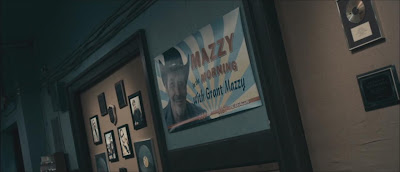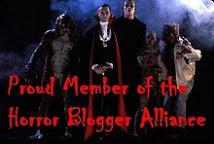The centerpiece of the film is clearly Stephen McHattie's performance as shock-jock-turned-morning-report-guy Grant Mazzy, a man who has clearly been sent to radio purgatory for sins that are never revealed to the viewer. The film's choice to leave us in the dark regarding Mazzy's path to the small town of Pontypool is a great move, because it makes it easy for the viewer to think about other things and ignore any questions about the man in the middle. As a result of this choice and McHattie's natural performance, Grant Mazzy becomes something of an underdog hero in the film. We know he's not a pure hero that we should root for - he does swear a lot and argue with his boss, after all - but he's got that charming antihero thing going on as he leads the film's charge.
Surrounding Mazzy, and taking up much of the film's landscape, is the outbreak. Or maybe I should call it an event, or an epidemic, or even a reckoning. As the film begins to roll, all we really know is that a woman is talking gibberish in the middle of a snow storm. But then the reports start to roll in to the station and Mazzy and company are tasked to make sense out of what's going on and then the fun part begins - because the viewer's imagination is asked to start working on its own image of Pontypool's big problem.
Director Bruce McDonald is definitely hiding his cards from the viewer - probably because it's a lot cheaper to talk about an uprising of flesh eaters than it is to show an uprising of flesh eaters - but at the same time he doesn't allow the film to get stagnant. The film could have ended up feeling like a stage play but the director finds subtle ways to involve the viewer. One of my favorite realizations about the film came when I noticed how the opening act is framed by a camera that seems to be constantly in motion, circling around our characters and occasionally changing its direction on a cut, a minor effect that seems to keep us moving around the characters despite the restrained setting.
By keeping its camera mobile while framing a small area and a small number of characters, Pontypool becomes quietly disorienting as it tells us about the events that started this nightmare for the radio man, the station's crew, and the mostly unseen small town. Looking back at the film, it's almost ironic that dangerous things only start happening to the characters after Mazzy proclaims he's "had enough of this" and leaves the radio booth - which means there's not much more spinning camera left in the film.
The film's most haunting sequence, which I'm willing to bet comes straight from the pages of author/screenwriter Tony Burgess' book Pontypool Changes Everything - is a series of black and white images that are shown while Mazzy reads odd an incredibly macabre sequence of obituaries. Recounting deaths - which I assume are only a small portion of what has gone on in the town - in a chronological and almost sadistic manner, McHattie's voice is calmly professional while also exhibiting a heavy dose of fear. The film uses this sequence mostly as a break between acts - and logic makes me think that it's unlikely that all the details that Mazzy gives here would have been available to him in the film's timeline - but at the same time it really does a lot of work selling the scale of this event to the viewer.
This all leads to the horrific final act, and the less I say about that is probably the better. That's partially because I don't want to ruin any of the surprises you're going to find, but also because I'm still not sure I completely understand all of it. It is perhaps the most ambitious explanation for a horror event that I know of, and - if nothing else - it helps cement the simple fact that Pontypool is a dynamite film that should not be ignored by anyone with an open mind to horror. The writer and director have mentioned that they were inspired by Orson Welles' infamous broadcast of War of the Worlds, and I think it's safe to say that their film recaptures that productions spirit of terrifying wonder perfectly. So check it out, and let your mind create its own visuals regarding this one-of-a-kind outbreak in Pontypool.

















1 comment:
This film surprised me, as I thought it might be atricky premise but its actually a great horror all in all
Post a Comment